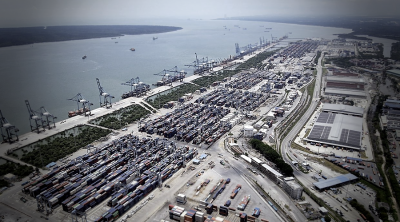
It is a profoundly troubling and almost heartbreaking sight when the King of Malaysia, His Majesty Sultan Ibrahim Ibni Almarhum Sultan Iskandar, the 17th Yang di-Pertuan Agong, must personally take to the streets to witness the state of his own capital city.
Today, the King walked 3.2 kilometers along Jalan Gallagher in Kuala Lumpur, only to find a scene that should never exist in a modern, thriving metropolis: untrimmed trees blocking pathways, clogged drains threatening floods, and a general atmosphere of neglect and decay.
This is not just a failure of infrastructure; it is a failure of governance, accountability, and respect for the citizens who pay taxes to ensure their cities are clean, safe, and well-maintained.
Kuala Lumpur City Hall: A massive workforce
Kuala Lumpur City Hall (DBKL) is a large organization, employing between 5,000 and 10,000 staff members. This sizeable workforce is tasked with maintaining the city’s public health and urban environment.
Yet, despite these resources and manpower, the King was compelled to highlight issues that should have been resolved through routine maintenance and proactive management.
The fact that such basic problems persist under the watch of a well-funded and staffed city hall is a damning indictment of the system.
The state of local authorities across Malaysia
Malaysia’s local government system is extensive, consisting of over 150 local authorities, including city councils, municipal councils, and district councils spread across urban and rural areas.
These bodies are responsible for the day-to-day upkeep of towns and cities, managing everything from waste collection to road maintenance and public health initiatives.
Yet, the question remains: among these many local authorities, how many are truly fulfilling their duties to the people?
Public health budget: Plenty of resources, no results
In 2025, the Ministry of Health was allocated a record RM45.3 billion, the second largest portion of the national budget. This represented a 9.8 percent increase from the previous year, with significant funds earmarked for infrastructure upgrades, operational expenses, and public health programs.
Given this substantial investment, the persistent problems of clogged drains, uncollected rubbish, and neglected greenery cannot be dismissed as mere budgetary constraints.
The resources are there; the failure lies elsewhere. By the way waste management is privatized in Malaysia.
Chronic non-performance: The real underlying issues
So why, despite adequate funding and manpower, do these problems continue unabated? The answer lies in several systemic issues:
Bureaucratic apathy: Local councils have developed a reputation for slow and unresponsive action.
Complaints about untrimmed trees or blocked drains often go unresolved for months, putting public safety and health at risk.
Lack of accountability: Officials, whether elected or appointed, rarely face consequences for poor performance.
The absence of transparent reporting and independent oversight fosters a culture of complacency.
Disconnect from citizens: While flashy events and sustainability forums are organized, often with grandiose settings and high-profile speakers, the everyday issues faced by residents remain ignored.
There is a troubling focus on optics rather than meaningful impact.
Leadership vacuum: Even attempts to engage higher authorities fall on deaf ears.
The Minister for Housing and state government, responsible for overseeing local authorities, remains unreachable despite repeated efforts to communicate pressing concerns.
The officers also appear unresponsive, signaling a systemic failure at the highest levels.
Klang: A microcosm of national malaise
My own experience in Klang perfectly illustrates this disconnect.
Recently, I attended a grand sustainability event held in a mammoth, air-conditioned tent with a huge LED backdrop.
The session featured CEOs from Northport and Westport discussing sustainability initiatives, moderated by the Port Klang Authority.
Yet, despite this pomp and circumstance, the reality on the ground was starkly different.
Drains overflowed with stagnant water, rubbish was left uncollected, potholes pocked the roads, and illegal posters cluttered every corner.
When I raised these issues during the Q&A session, with the newly appointed Mayor who as present during the session, the response was muted, and no concrete solutions were offered.
To make matters worse, a close friend of mine has been petitioning the Klang Town Council for over six months to trim dangerous trees near his home in Bandar Botanic.
Despite more than ten visits and numerous emails since January, no action has been taken.
It is difficult not to feel despair when even basic requests for safety and cleanliness are ignored.
I sincerely hope that His Royal Highness the Sultan of Selangor (pardon my call) will take a walk through Klang or Port Klang. Perhaps then, the reality of neglect will be impossible to ignore.
Where are we going wrong?
The root cause of these failures is clear: local authorities are taking their responsibilities lightly because they can.
Years of unchecked inefficiency, minimal public pressure, and lax oversight from the Ministry of Housing and the state governments have created an environment where mediocrity is tolerated and even expected.
Citizens, worn down by repeated inaction, have largely given up hope, further emboldening this culture of neglect.
A call to action: Restoring accountability and service
It should never be the role of the King to personally inspect and call out basic municipal failures.
The Ministry of Housing and the state governments must urgently step up to enforce strict accountability measures, implement transparent reporting systems, and ensure that local councils prioritize the real needs of the people over empty ceremonies and self-congratulatory events.
Only through decisive leadership, genuine public engagement, and a commitment to service can Malaysia’s urban decay be reversed.
Until then, the sad spectacle of royal footsteps walking neglected streets will remain a national embarrassment—one that no amount of pomp or budget can remedy without true reform.
Our King’s Walk today is a wake-up call for all Malaysians. It is a reminder that public health and safety are not luxuries but fundamental rights, and that those entrusted with these responsibilities must be held to the highest standards.
For the sake of our cities, our citizens, and our nation’s dignity, it is time to demand better.
(Ravindran Raman Kutty is an active social worker.)
ADVERTISEMENT
ADVERTISEMENT








































